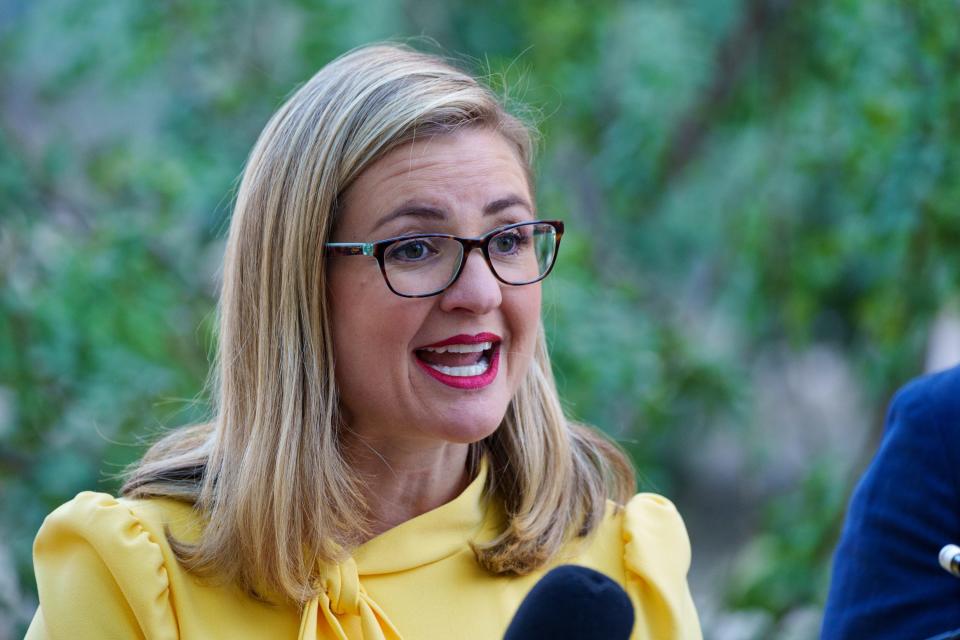Phoenix light rail extensions move forward despite gutted funding in new Proposition 400
Local leaders say two Phoenix light rail extensions will move forward, despite Arizona lawmakers banning funding for them in a regional transportation tax proposal that Maricopa County residents will vote on this November.
The regional half-cent sales tax, called Proposition 400, provides funding for Valley highways, roads and public transportation. Mayors across Maricopa County approved a plan to use some of the half-cent sales tax for light rail extensions but needed the Legislature's approval before sending the proposition to county voters.
One light rail extension was planned to run parallel to Interstate 10 from downtown Phoenix to 79th Avenue, and another was planned in the vicinity of 19th and 43rd avenues between Bethany Home and Indian School roads.
But lawmakers on Monday said Proposition 400 funding could be used only for operations and maintenance of light rail, not extensions. The stipulation creates a $1 billion gap in funding for the projects. Still, local leaders say they'll be able to move forward.
"Within those funding sources and the allocations set forth, the region is still able to deliver the projects outlined in the Regional Transportation Plan," said John Bullen, funding policy manager for Maricopa Association of Governments, a regional agency comprised of mayors, who plan regional infrastructure projects.
That, he believes, is because that half-cent sales tax is just one of the multiple sources that fund Maricopa County's Regional Transportation Plan, otherwise known as Momentum 2050. Other sources included state revenue, federal matching funds, and local transit taxes.
Phoenix, Mesa and Tempe residents, for example, all pay local transit taxes. Phoenix could use its own Transportation 2050 tax fund, which voters approved in 2015, to pay for light rail. It could use Proposition 400 funding to backfill bus operations.

Phoenix Mayor Kate Gallego celebrated the compromise saying, "I am glad that our robust, unanimously approved transportation plan will finally reach the voters of Maricopa County. ... With approval from our voters, its passage will ultimately mean that we can deliver on improved and expanded transit and transportation services that connect county residents to jobs, education, and more."
Gallego also touted the bus system as "the backbone of our transit system in Phoenix – and while Phoenix has a local funding source, the region does not. The passed plan will enable us to continue building on this program, which is a victory for working people across the Valley."
Arielle Devorah, a spokesperson for Gallego, said the city was already evaluating how its own local transit taxes could be used for the light rail extensions and that the mayor was committed to seeing the projects to fruition.
Valley Metro CEO Jessica Mefford-Miller said it was "an exciting day," and pointed to how Proposition 400, despite banning funding for light rail extensions, actually increases public transit's allocation from 33% to 37%. The regional sales tax also provides 3.5% funding for light rail operations and maintenance.
Another caveat of Arizona lawmakers' compromise is that Phoenix will need to re-route its light rail extension to the state Capitol. The light rail can pass near the Capitol but not directly adjacent. The lawmakers prohibited light rail from being constructed between 17th and 18th avenues on Adams or Jefferson streets.
Mefford-Miller said Valley Metro and Phoenix would work with the community to devise a new path. Phoenix will need to come up with funding for any excess costs that result from the re-route. The Capitol loop has previously secured funding through tax revenue from the existing version of Proposition 400 that voters passed in 2004.

The new Proposition 400 extension plan comes a year after former Gov. Doug Ducey rejected the regional plan last year in his final year in office. He cited soaring inflation and a lack of transparency in the bill.
One other light rail expansion planned within Phoenix city limits, but unaffected by this week's action, is the South Central extension, which is currently being built with existing funding. It's due to be completed next year. Another long-term light-rail project, a Northeast Extension toward Paradise Valley Mall, has no funding and was deferred indefinitely years ago.
Reporter Taylor Seely covers Phoenix City Hall for The Arizona Republic. Reach her at tseely@arizonarepublic.com or by phone at 480-476-6116.
This article originally appeared on Arizona Republic: Phoenix light rail extensions to move forward despite gutted funding

